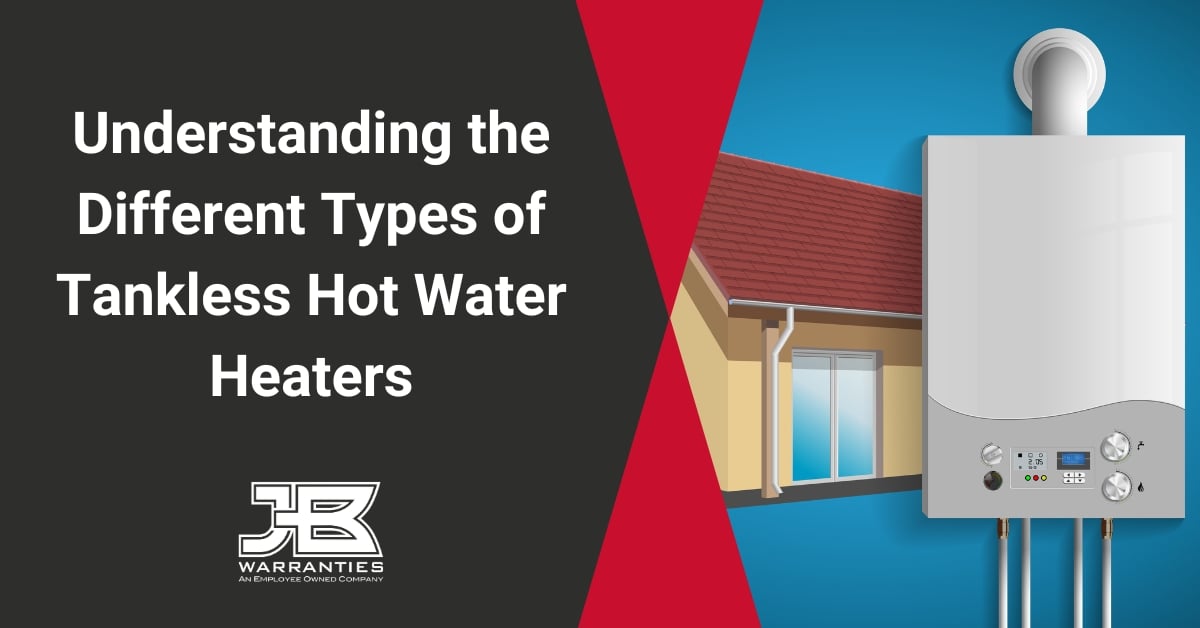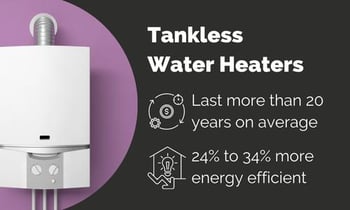
In today’s plumbing market, it’s not surprising that many professionals have encountered a higher demand for tankless hot water heater solutions. In 2021, the global tankless water heater market size was valued at $6.3 billion — and, get this, the market size is expected to almost double by 2031 to reach a projected value of over $12.3 billion! That's impressive growth.
As a plumbing professional, it's your duty to stay up to date with the latest industry innovations to meet current customer hot water demands adequately. With a continuously growing interest in tankless water heaters, it’s essential to understand the capabilities, benefits, and various options of tankless hot water heaters to provide customers with the purchase insight they require.
Keep reading to learn more about tankless water heaters and the variety of solutions you can offer!
What is a Tankless Water Heater?
Tankless hot water heaters, often called on-demand, instantaneous, or demand water heaters, are plumbing solutions that heat water as needed. Unlike traditional tank water heaters, tankless options are compact systems that can be mounted on a wall and heat water using a gas or electric element once a water source, such as a sink or bathtub, is turned on. With no need for a hot water storage tank, tankless systems provide homeowners an endless hot water supply.
What are the Benefits of a Tankless Water Heater?
Aside from their compact, space-saving size, many benefits fuel the higher demand for tankless hot water heaters. According to the U.S. Department of Energy, tankless hot water heaters are between 24% and 34% more efficient than conventional storage tank water heaters. With energy savings also comes financial savings that help customers save hundreds of dollars on energy bills annually.
Furthermore, while the upfront costs of a new tankless water heating solution can be more expensive compared to conventional tank hot water heaters, the unit's life span more than makes up for the price. A tank-style water heater lasts up to 12 years on average, while most tankless water heater solutions have an average life span of roughly 20 years with proper upkeep.

What are the Different Types of Tankless Water Heaters?
When purchasing a new tankless water heater, there are two primary types for customers to choose from. To help better inform customers on their best options, research the following options:
Non-condensing
Non-condensing tankless hot water heaters use a primary heat exchanger to heat a home’s water supply. Because of this, a non-condensing unit must emit a hot exhaust which requires the installation of a vent system for the exhaust to be released outside the home. This system is ideal for customers who desire simplified maintenance needs and reside in warmer climates with higher groundwater temperatures.
Condensing
Compared to non-condensing, condensing tankless hot water heaters have multiple heat exchangers that allow the unit to capture the exhaust from each exchanger and repurpose it for water heating. Due to this capability, a vent system is not required, but a condensation drain is. The multiple heat exchangers offer higher energy efficiency to customers and are ideal for those in colder climates with low groundwater temperatures.
Considerations When Purchasing a Tankless Water Heater
Whether you recommend a non-condensing or condensing tankless water heater to customers, there are additional considerations they must take before making a final purchase, including:
Size
With a variety of house sizes and specific water heating needs will also come a wide selection of tankless water heater sizes. To ensure you’re recommending the right size for a customer, you must consider the flow rate of the home or business. This rate can be calculated by adding the gallons per minute (GPM) rating for each plumbing fixture inside the house.
For example, let’s use these GPM ratings for each plumbing fixture inside a single-family home:
- Kitchen Sink - 2.0 GPM
- Bathroom Sink - 1.5 GPM
- Dishwasher - 1.5 GPM
- Washing Machine - 2.0 GPM
- Shower - 3.0 GPM
With a total home flow rate of 10 GPM, you can anticipate that a homeowner will not require a tankless system with a flow rate that exceeds this total. However, if the customer wants to run the dishwasher, washing machine, and shower simultaneously, they will require a tankless water heater system with a minimum 6.5 flow rate.
Fuel Type
In addition to the required flow rate, plumbers must remain mindful of the fuel type a customer wishes to use. Depending on a homeowner’s target maintenance costs, energy bills savings, and flow rate, they must choose between an electric tankless water heater and a gas-powered one.
Electric tankless water heaters are often more efficient and waste less energy than gas alternatives. These systems are far easier to install without running gas lines. However, they have a more restricted flow rate and often only serve one to two plumbing fixtures at a time, which makes electric tankless water heaters a questionable choice for large-family homes.
Gas tankless water heaters often have a higher flow rate and typically can produce much more hot water per minute than electric tankless hot water heaters. However, the installation costs of gas units are much higher than electric water heaters due to the need for special plumbing and gas line configuration, which can influence customer decisions.
JB Warranties Provides Peace of Mind on Tankless Water Heater Purchases
Once your customer has settled on a new tankless hot water heater, be sure to cap off your top-tier customer service by offering a quality extended warranty solution. From electric water heaters to gas-powered hot water solutions, JB Warranties Premium Protection Plan covers all major brands and provides a fast claims process, stress-free labor reimbursements, and affordable pricing.
Contact JB Warranties today to learn how our extended warranty services can help provide your customers peace of mind after investing in a new tankless water heater solution!
Nick Ahrens
National Account Manager






